Mental Health Case Study: Chung's Condition, Factors, and Recovery
VerifiedAdded on 2020/12/29
|8
|2347
|105
Case Study
AI Summary
This case study focuses on Chung, a 35-year-old doctor from China living in Australia, who is experiencing various mental health issues including high levels of consciousness, insomnia, fleeting thoughts of suicide, and symptoms of depression. The report analyzes his mental state examination and discusses two primary factors contributing to his condition based on the Stress Vulnerability Model: stress from long working hours, workplace pressures, and family issues, and vulnerability stemming from early life experiences and potential genetic predispositions. Furthermore, the study emphasizes the importance of three positive aspects of mental health recovery: respect, empowerment, and hope, and how these principles can be applied to improve Chung's condition and help him lead a meaningful life. The case study concludes that Chung needs to adopt the three principles of mental health recovery to reduce his stress and vulnerability.

Case Study
Paraphrase This Document
Need a fresh take? Get an instant paraphrase of this document with our AI Paraphraser
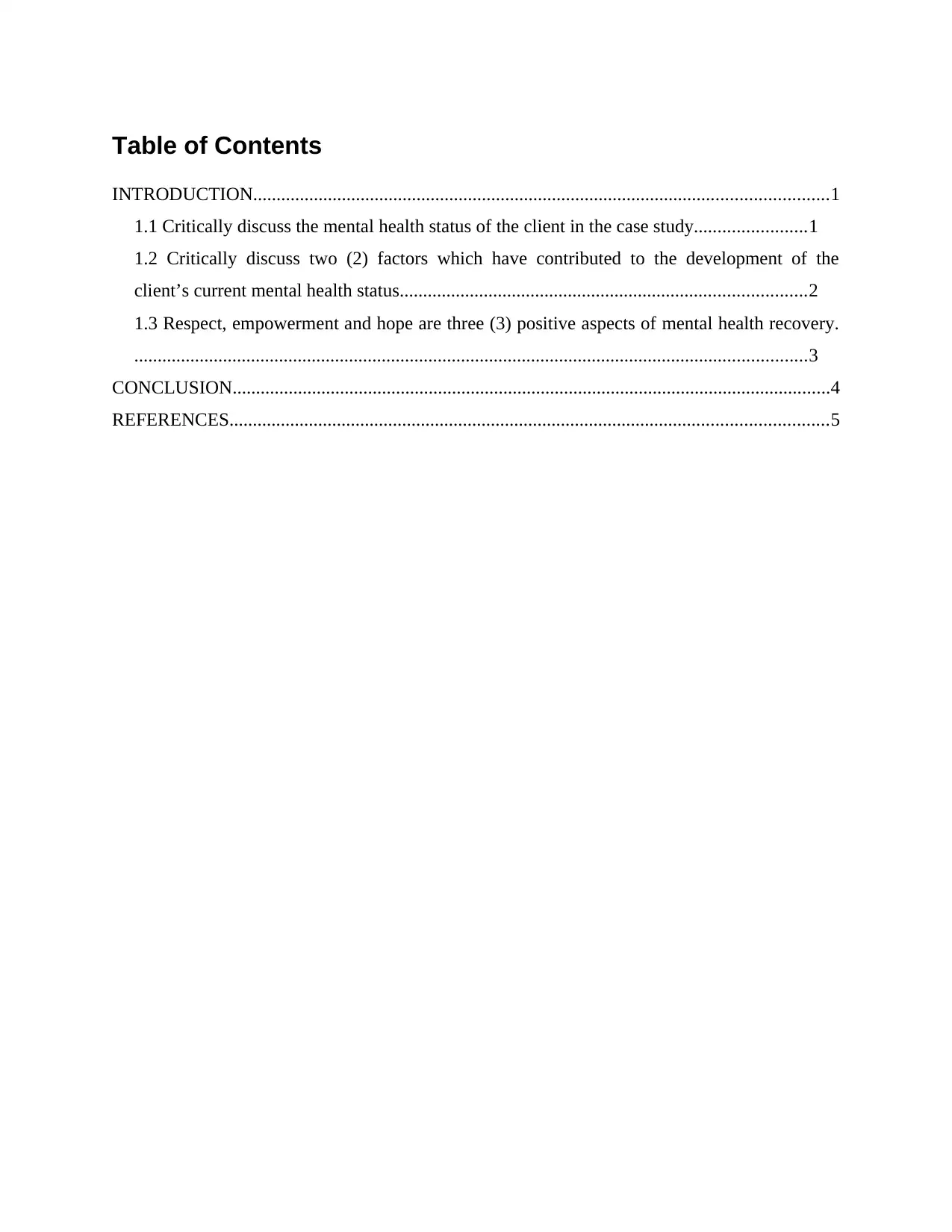
Table of Contents
INTRODUCTION...........................................................................................................................1
1.1 Critically discuss the mental health status of the client in the case study........................1
1.2 Critically discuss two (2) factors which have contributed to the development of the
client’s current mental health status.......................................................................................2
1.3 Respect, empowerment and hope are three (3) positive aspects of mental health recovery.
................................................................................................................................................3
CONCLUSION................................................................................................................................4
REFERENCES................................................................................................................................5
INTRODUCTION...........................................................................................................................1
1.1 Critically discuss the mental health status of the client in the case study........................1
1.2 Critically discuss two (2) factors which have contributed to the development of the
client’s current mental health status.......................................................................................2
1.3 Respect, empowerment and hope are three (3) positive aspects of mental health recovery.
................................................................................................................................................3
CONCLUSION................................................................................................................................4
REFERENCES................................................................................................................................5
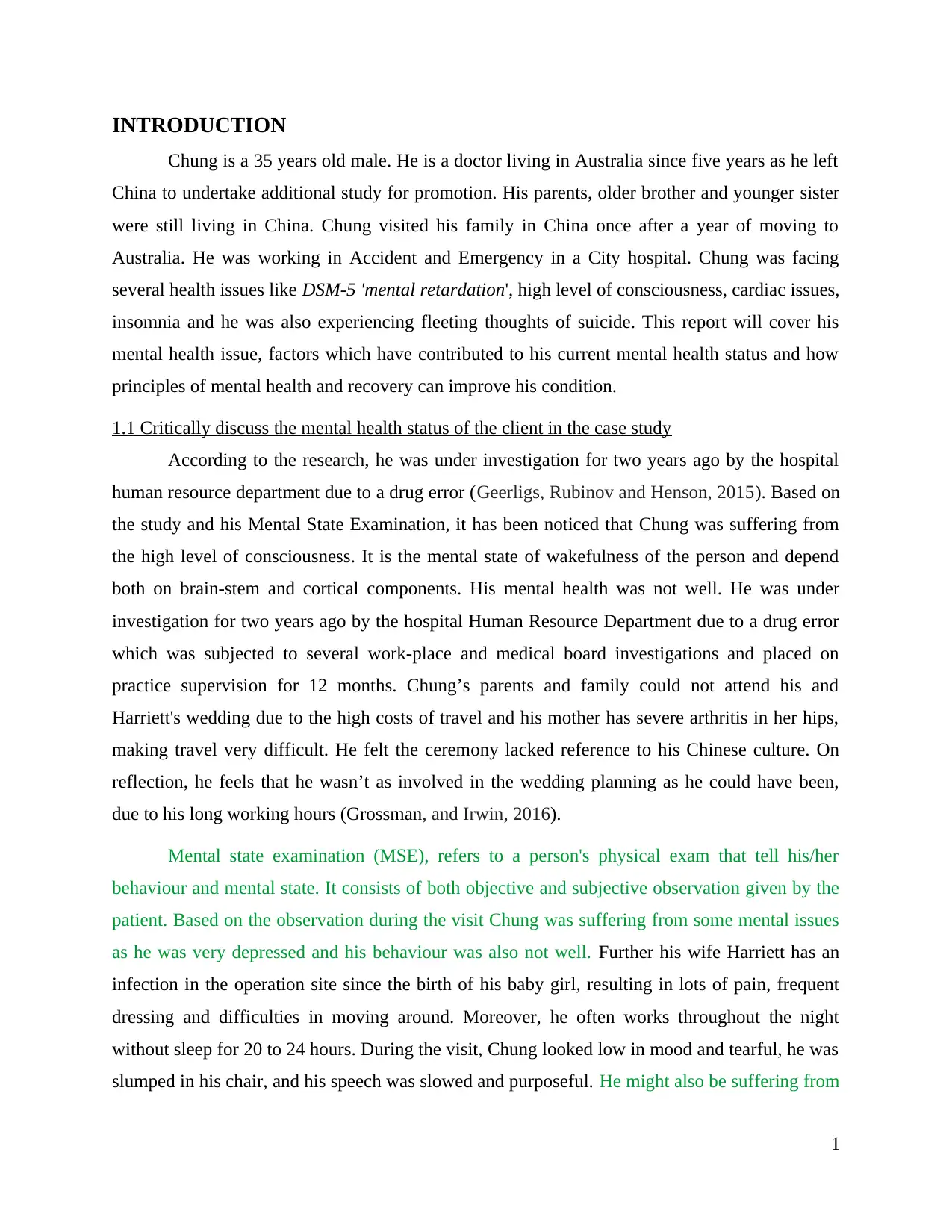
INTRODUCTION
Chung is a 35 years old male. He is a doctor living in Australia since five years as he left
China to undertake additional study for promotion. His parents, older brother and younger sister
were still living in China. Chung visited his family in China once after a year of moving to
Australia. He was working in Accident and Emergency in a City hospital. Chung was facing
several health issues like DSM-5 'mental retardation', high level of consciousness, cardiac issues,
insomnia and he was also experiencing fleeting thoughts of suicide. This report will cover his
mental health issue, factors which have contributed to his current mental health status and how
principles of mental health and recovery can improve his condition.
1.1 Critically discuss the mental health status of the client in the case study
According to the research, he was under investigation for two years ago by the hospital
human resource department due to a drug error (Geerligs, Rubinov and Henson, 2015). Based on
the study and his Mental State Examination, it has been noticed that Chung was suffering from
the high level of consciousness. It is the mental state of wakefulness of the person and depend
both on brain-stem and cortical components. His mental health was not well. He was under
investigation for two years ago by the hospital Human Resource Department due to a drug error
which was subjected to several work-place and medical board investigations and placed on
practice supervision for 12 months. Chung’s parents and family could not attend his and
Harriett's wedding due to the high costs of travel and his mother has severe arthritis in her hips,
making travel very difficult. He felt the ceremony lacked reference to his Chinese culture. On
reflection, he feels that he wasn’t as involved in the wedding planning as he could have been,
due to his long working hours (Grossman, and Irwin, 2016).
Mental state examination (MSE), refers to a person's physical exam that tell his/her
behaviour and mental state. It consists of both objective and subjective observation given by the
patient. Based on the observation during the visit Chung was suffering from some mental issues
as he was very depressed and his behaviour was also not well. Further his wife Harriett has an
infection in the operation site since the birth of his baby girl, resulting in lots of pain, frequent
dressing and difficulties in moving around. Moreover, he often works throughout the night
without sleep for 20 to 24 hours. During the visit, Chung looked low in mood and tearful, he was
slumped in his chair, and his speech was slowed and purposeful. He might also be suffering from
1
Chung is a 35 years old male. He is a doctor living in Australia since five years as he left
China to undertake additional study for promotion. His parents, older brother and younger sister
were still living in China. Chung visited his family in China once after a year of moving to
Australia. He was working in Accident and Emergency in a City hospital. Chung was facing
several health issues like DSM-5 'mental retardation', high level of consciousness, cardiac issues,
insomnia and he was also experiencing fleeting thoughts of suicide. This report will cover his
mental health issue, factors which have contributed to his current mental health status and how
principles of mental health and recovery can improve his condition.
1.1 Critically discuss the mental health status of the client in the case study
According to the research, he was under investigation for two years ago by the hospital
human resource department due to a drug error (Geerligs, Rubinov and Henson, 2015). Based on
the study and his Mental State Examination, it has been noticed that Chung was suffering from
the high level of consciousness. It is the mental state of wakefulness of the person and depend
both on brain-stem and cortical components. His mental health was not well. He was under
investigation for two years ago by the hospital Human Resource Department due to a drug error
which was subjected to several work-place and medical board investigations and placed on
practice supervision for 12 months. Chung’s parents and family could not attend his and
Harriett's wedding due to the high costs of travel and his mother has severe arthritis in her hips,
making travel very difficult. He felt the ceremony lacked reference to his Chinese culture. On
reflection, he feels that he wasn’t as involved in the wedding planning as he could have been,
due to his long working hours (Grossman, and Irwin, 2016).
Mental state examination (MSE), refers to a person's physical exam that tell his/her
behaviour and mental state. It consists of both objective and subjective observation given by the
patient. Based on the observation during the visit Chung was suffering from some mental issues
as he was very depressed and his behaviour was also not well. Further his wife Harriett has an
infection in the operation site since the birth of his baby girl, resulting in lots of pain, frequent
dressing and difficulties in moving around. Moreover, he often works throughout the night
without sleep for 20 to 24 hours. During the visit, Chung looked low in mood and tearful, he was
slumped in his chair, and his speech was slowed and purposeful. He might also be suffering from
1
⊘ This is a preview!⊘
Do you want full access?
Subscribe today to unlock all pages.

Trusted by 1+ million students worldwide
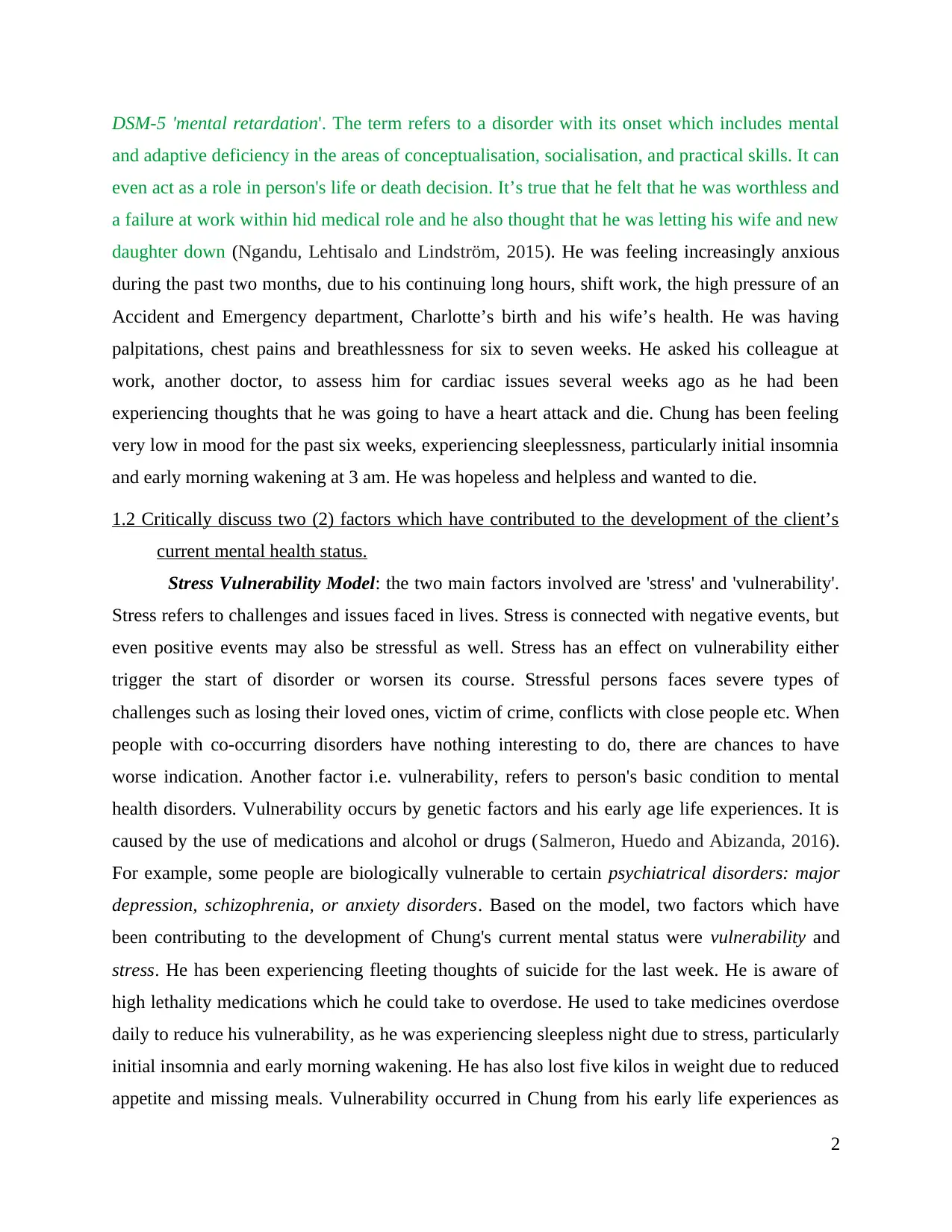
DSM-5 'mental retardation'. The term refers to a disorder with its onset which includes mental
and adaptive deficiency in the areas of conceptualisation, socialisation, and practical skills. It can
even act as a role in person's life or death decision. It’s true that he felt that he was worthless and
a failure at work within hid medical role and he also thought that he was letting his wife and new
daughter down (Ngandu, Lehtisalo and Lindström, 2015). He was feeling increasingly anxious
during the past two months, due to his continuing long hours, shift work, the high pressure of an
Accident and Emergency department, Charlotte’s birth and his wife’s health. He was having
palpitations, chest pains and breathlessness for six to seven weeks. He asked his colleague at
work, another doctor, to assess him for cardiac issues several weeks ago as he had been
experiencing thoughts that he was going to have a heart attack and die. Chung has been feeling
very low in mood for the past six weeks, experiencing sleeplessness, particularly initial insomnia
and early morning wakening at 3 am. He was hopeless and helpless and wanted to die.
1.2 Critically discuss two (2) factors which have contributed to the development of the client’s
current mental health status.
Stress Vulnerability Model: the two main factors involved are 'stress' and 'vulnerability'.
Stress refers to challenges and issues faced in lives. Stress is connected with negative events, but
even positive events may also be stressful as well. Stress has an effect on vulnerability either
trigger the start of disorder or worsen its course. Stressful persons faces severe types of
challenges such as losing their loved ones, victim of crime, conflicts with close people etc. When
people with co-occurring disorders have nothing interesting to do, there are chances to have
worse indication. Another factor i.e. vulnerability, refers to person's basic condition to mental
health disorders. Vulnerability occurs by genetic factors and his early age life experiences. It is
caused by the use of medications and alcohol or drugs (Salmeron, Huedo and Abizanda, 2016).
For example, some people are biologically vulnerable to certain psychiatrical disorders: major
depression, schizophrenia, or anxiety disorders. Based on the model, two factors which have
been contributing to the development of Chung's current mental status were vulnerability and
stress. He has been experiencing fleeting thoughts of suicide for the last week. He is aware of
high lethality medications which he could take to overdose. He used to take medicines overdose
daily to reduce his vulnerability, as he was experiencing sleepless night due to stress, particularly
initial insomnia and early morning wakening. He has also lost five kilos in weight due to reduced
appetite and missing meals. Vulnerability occurred in Chung from his early life experiences as
2
and adaptive deficiency in the areas of conceptualisation, socialisation, and practical skills. It can
even act as a role in person's life or death decision. It’s true that he felt that he was worthless and
a failure at work within hid medical role and he also thought that he was letting his wife and new
daughter down (Ngandu, Lehtisalo and Lindström, 2015). He was feeling increasingly anxious
during the past two months, due to his continuing long hours, shift work, the high pressure of an
Accident and Emergency department, Charlotte’s birth and his wife’s health. He was having
palpitations, chest pains and breathlessness for six to seven weeks. He asked his colleague at
work, another doctor, to assess him for cardiac issues several weeks ago as he had been
experiencing thoughts that he was going to have a heart attack and die. Chung has been feeling
very low in mood for the past six weeks, experiencing sleeplessness, particularly initial insomnia
and early morning wakening at 3 am. He was hopeless and helpless and wanted to die.
1.2 Critically discuss two (2) factors which have contributed to the development of the client’s
current mental health status.
Stress Vulnerability Model: the two main factors involved are 'stress' and 'vulnerability'.
Stress refers to challenges and issues faced in lives. Stress is connected with negative events, but
even positive events may also be stressful as well. Stress has an effect on vulnerability either
trigger the start of disorder or worsen its course. Stressful persons faces severe types of
challenges such as losing their loved ones, victim of crime, conflicts with close people etc. When
people with co-occurring disorders have nothing interesting to do, there are chances to have
worse indication. Another factor i.e. vulnerability, refers to person's basic condition to mental
health disorders. Vulnerability occurs by genetic factors and his early age life experiences. It is
caused by the use of medications and alcohol or drugs (Salmeron, Huedo and Abizanda, 2016).
For example, some people are biologically vulnerable to certain psychiatrical disorders: major
depression, schizophrenia, or anxiety disorders. Based on the model, two factors which have
been contributing to the development of Chung's current mental status were vulnerability and
stress. He has been experiencing fleeting thoughts of suicide for the last week. He is aware of
high lethality medications which he could take to overdose. He used to take medicines overdose
daily to reduce his vulnerability, as he was experiencing sleepless night due to stress, particularly
initial insomnia and early morning wakening. He has also lost five kilos in weight due to reduced
appetite and missing meals. Vulnerability occurred in Chung from his early life experiences as
2
Paraphrase This Document
Need a fresh take? Get an instant paraphrase of this document with our AI Paraphraser
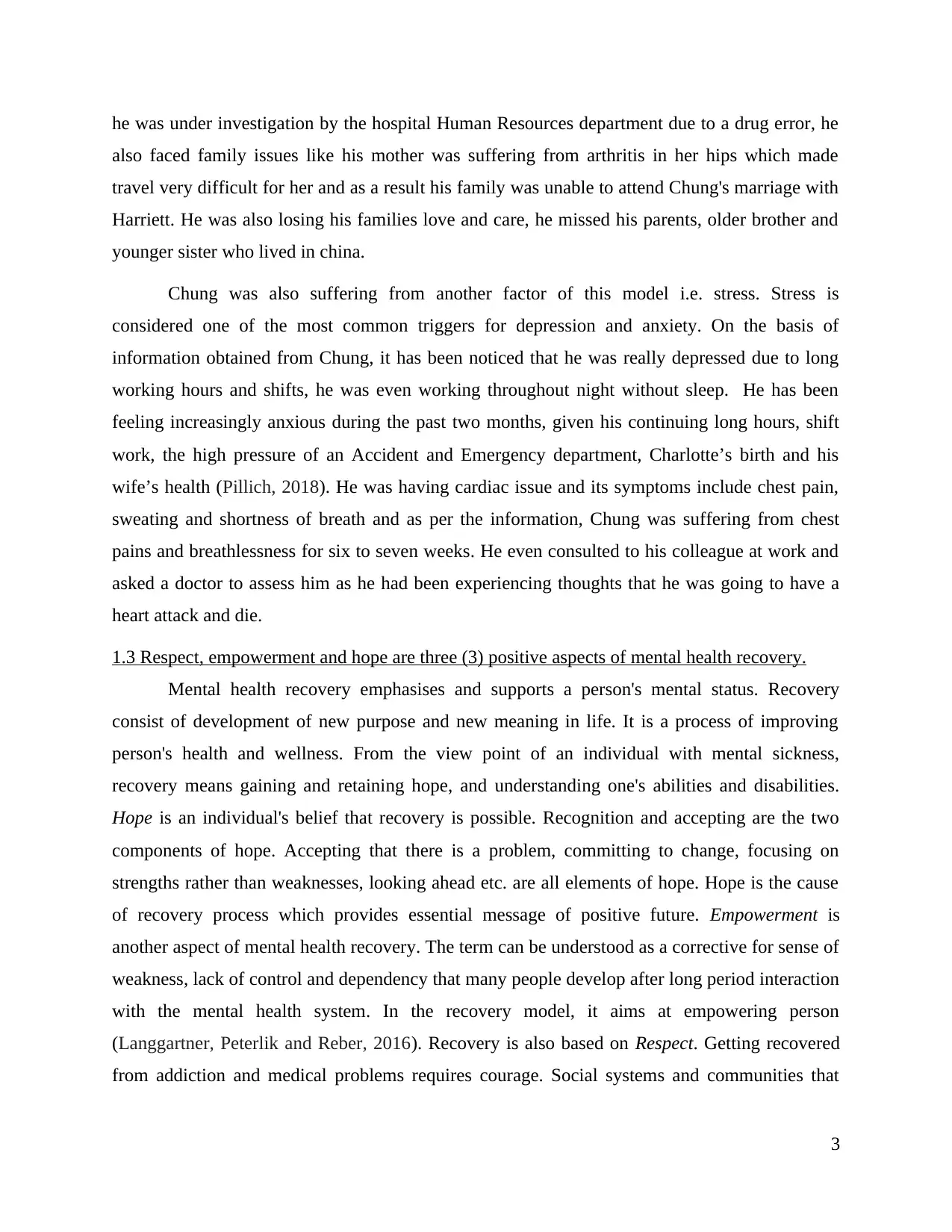
he was under investigation by the hospital Human Resources department due to a drug error, he
also faced family issues like his mother was suffering from arthritis in her hips which made
travel very difficult for her and as a result his family was unable to attend Chung's marriage with
Harriett. He was also losing his families love and care, he missed his parents, older brother and
younger sister who lived in china.
Chung was also suffering from another factor of this model i.e. stress. Stress is
considered one of the most common triggers for depression and anxiety. On the basis of
information obtained from Chung, it has been noticed that he was really depressed due to long
working hours and shifts, he was even working throughout night without sleep. He has been
feeling increasingly anxious during the past two months, given his continuing long hours, shift
work, the high pressure of an Accident and Emergency department, Charlotte’s birth and his
wife’s health (Pillich, 2018). He was having cardiac issue and its symptoms include chest pain,
sweating and shortness of breath and as per the information, Chung was suffering from chest
pains and breathlessness for six to seven weeks. He even consulted to his colleague at work and
asked a doctor to assess him as he had been experiencing thoughts that he was going to have a
heart attack and die.
1.3 Respect, empowerment and hope are three (3) positive aspects of mental health recovery.
Mental health recovery emphasises and supports a person's mental status. Recovery
consist of development of new purpose and new meaning in life. It is a process of improving
person's health and wellness. From the view point of an individual with mental sickness,
recovery means gaining and retaining hope, and understanding one's abilities and disabilities.
Hope is an individual's belief that recovery is possible. Recognition and accepting are the two
components of hope. Accepting that there is a problem, committing to change, focusing on
strengths rather than weaknesses, looking ahead etc. are all elements of hope. Hope is the cause
of recovery process which provides essential message of positive future. Empowerment is
another aspect of mental health recovery. The term can be understood as a corrective for sense of
weakness, lack of control and dependency that many people develop after long period interaction
with the mental health system. In the recovery model, it aims at empowering person
(Langgartner, Peterlik and Reber, 2016). Recovery is also based on Respect. Getting recovered
from addiction and medical problems requires courage. Social systems and communities that
3
also faced family issues like his mother was suffering from arthritis in her hips which made
travel very difficult for her and as a result his family was unable to attend Chung's marriage with
Harriett. He was also losing his families love and care, he missed his parents, older brother and
younger sister who lived in china.
Chung was also suffering from another factor of this model i.e. stress. Stress is
considered one of the most common triggers for depression and anxiety. On the basis of
information obtained from Chung, it has been noticed that he was really depressed due to long
working hours and shifts, he was even working throughout night without sleep. He has been
feeling increasingly anxious during the past two months, given his continuing long hours, shift
work, the high pressure of an Accident and Emergency department, Charlotte’s birth and his
wife’s health (Pillich, 2018). He was having cardiac issue and its symptoms include chest pain,
sweating and shortness of breath and as per the information, Chung was suffering from chest
pains and breathlessness for six to seven weeks. He even consulted to his colleague at work and
asked a doctor to assess him as he had been experiencing thoughts that he was going to have a
heart attack and die.
1.3 Respect, empowerment and hope are three (3) positive aspects of mental health recovery.
Mental health recovery emphasises and supports a person's mental status. Recovery
consist of development of new purpose and new meaning in life. It is a process of improving
person's health and wellness. From the view point of an individual with mental sickness,
recovery means gaining and retaining hope, and understanding one's abilities and disabilities.
Hope is an individual's belief that recovery is possible. Recognition and accepting are the two
components of hope. Accepting that there is a problem, committing to change, focusing on
strengths rather than weaknesses, looking ahead etc. are all elements of hope. Hope is the cause
of recovery process which provides essential message of positive future. Empowerment is
another aspect of mental health recovery. The term can be understood as a corrective for sense of
weakness, lack of control and dependency that many people develop after long period interaction
with the mental health system. In the recovery model, it aims at empowering person
(Langgartner, Peterlik and Reber, 2016). Recovery is also based on Respect. Getting recovered
from addiction and medical problems requires courage. Social systems and communities that
3
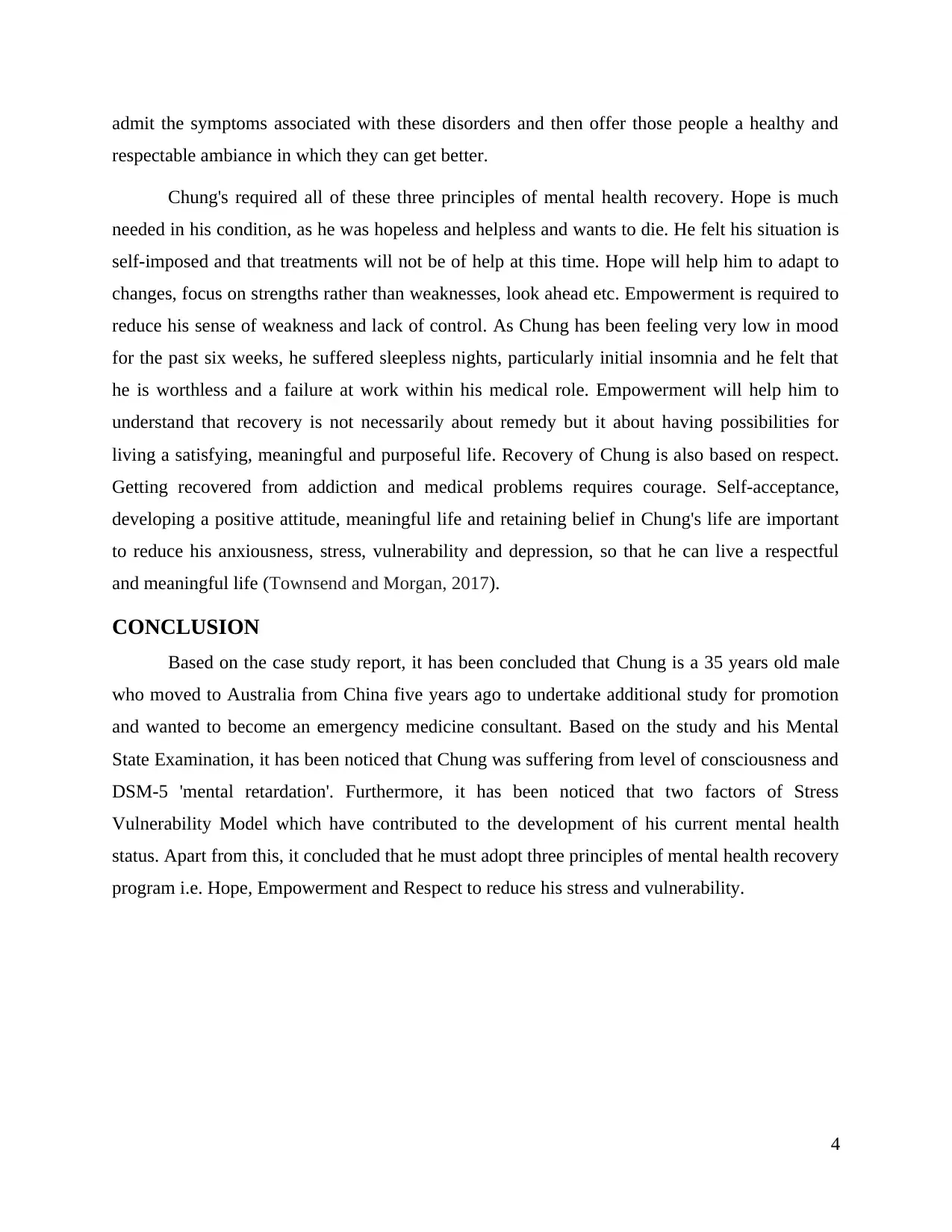
admit the symptoms associated with these disorders and then offer those people a healthy and
respectable ambiance in which they can get better.
Chung's required all of these three principles of mental health recovery. Hope is much
needed in his condition, as he was hopeless and helpless and wants to die. He felt his situation is
self-imposed and that treatments will not be of help at this time. Hope will help him to adapt to
changes, focus on strengths rather than weaknesses, look ahead etc. Empowerment is required to
reduce his sense of weakness and lack of control. As Chung has been feeling very low in mood
for the past six weeks, he suffered sleepless nights, particularly initial insomnia and he felt that
he is worthless and a failure at work within his medical role. Empowerment will help him to
understand that recovery is not necessarily about remedy but it about having possibilities for
living a satisfying, meaningful and purposeful life. Recovery of Chung is also based on respect.
Getting recovered from addiction and medical problems requires courage. Self-acceptance,
developing a positive attitude, meaningful life and retaining belief in Chung's life are important
to reduce his anxiousness, stress, vulnerability and depression, so that he can live a respectful
and meaningful life (Townsend and Morgan, 2017).
CONCLUSION
Based on the case study report, it has been concluded that Chung is a 35 years old male
who moved to Australia from China five years ago to undertake additional study for promotion
and wanted to become an emergency medicine consultant. Based on the study and his Mental
State Examination, it has been noticed that Chung was suffering from level of consciousness and
DSM-5 'mental retardation'. Furthermore, it has been noticed that two factors of Stress
Vulnerability Model which have contributed to the development of his current mental health
status. Apart from this, it concluded that he must adopt three principles of mental health recovery
program i.e. Hope, Empowerment and Respect to reduce his stress and vulnerability.
4
respectable ambiance in which they can get better.
Chung's required all of these three principles of mental health recovery. Hope is much
needed in his condition, as he was hopeless and helpless and wants to die. He felt his situation is
self-imposed and that treatments will not be of help at this time. Hope will help him to adapt to
changes, focus on strengths rather than weaknesses, look ahead etc. Empowerment is required to
reduce his sense of weakness and lack of control. As Chung has been feeling very low in mood
for the past six weeks, he suffered sleepless nights, particularly initial insomnia and he felt that
he is worthless and a failure at work within his medical role. Empowerment will help him to
understand that recovery is not necessarily about remedy but it about having possibilities for
living a satisfying, meaningful and purposeful life. Recovery of Chung is also based on respect.
Getting recovered from addiction and medical problems requires courage. Self-acceptance,
developing a positive attitude, meaningful life and retaining belief in Chung's life are important
to reduce his anxiousness, stress, vulnerability and depression, so that he can live a respectful
and meaningful life (Townsend and Morgan, 2017).
CONCLUSION
Based on the case study report, it has been concluded that Chung is a 35 years old male
who moved to Australia from China five years ago to undertake additional study for promotion
and wanted to become an emergency medicine consultant. Based on the study and his Mental
State Examination, it has been noticed that Chung was suffering from level of consciousness and
DSM-5 'mental retardation'. Furthermore, it has been noticed that two factors of Stress
Vulnerability Model which have contributed to the development of his current mental health
status. Apart from this, it concluded that he must adopt three principles of mental health recovery
program i.e. Hope, Empowerment and Respect to reduce his stress and vulnerability.
4
⊘ This is a preview!⊘
Do you want full access?
Subscribe today to unlock all pages.

Trusted by 1+ million students worldwide
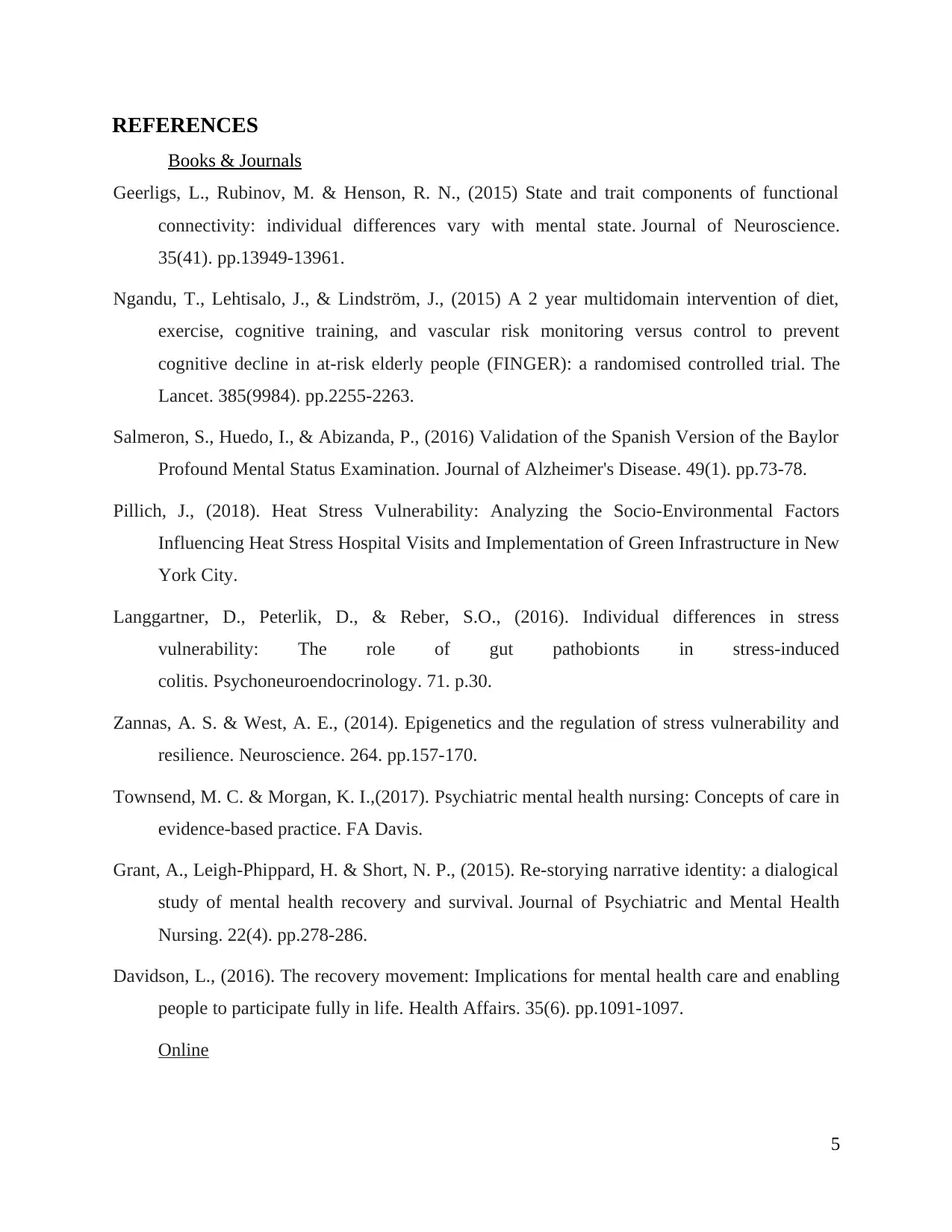
REFERENCES
Books & Journals
Geerligs, L., Rubinov, M. & Henson, R. N., (2015) State and trait components of functional
connectivity: individual differences vary with mental state. Journal of Neuroscience.
35(41). pp.13949-13961.
Ngandu, T., Lehtisalo, J., & Lindström, J., (2015) A 2 year multidomain intervention of diet,
exercise, cognitive training, and vascular risk monitoring versus control to prevent
cognitive decline in at-risk elderly people (FINGER): a randomised controlled trial. The
Lancet. 385(9984). pp.2255-2263.
Salmeron, S., Huedo, I., & Abizanda, P., (2016) Validation of the Spanish Version of the Baylor
Profound Mental Status Examination. Journal of Alzheimer's Disease. 49(1). pp.73-78.
Pillich, J., (2018). Heat Stress Vulnerability: Analyzing the Socio-Environmental Factors
Influencing Heat Stress Hospital Visits and Implementation of Green Infrastructure in New
York City.
Langgartner, D., Peterlik, D., & Reber, S.O., (2016). Individual differences in stress
vulnerability: The role of gut pathobionts in stress-induced
colitis. Psychoneuroendocrinology. 71. p.30.
Zannas, A. S. & West, A. E., (2014). Epigenetics and the regulation of stress vulnerability and
resilience. Neuroscience. 264. pp.157-170.
Townsend, M. C. & Morgan, K. I.,(2017). Psychiatric mental health nursing: Concepts of care in
evidence-based practice. FA Davis.
Grant, A., Leigh‐Phippard, H. & Short, N. P., (2015). Re‐storying narrative identity: a dialogical
study of mental health recovery and survival. Journal of Psychiatric and Mental Health
Nursing. 22(4). pp.278-286.
Davidson, L., (2016). The recovery movement: Implications for mental health care and enabling
people to participate fully in life. Health Affairs. 35(6). pp.1091-1097.
Online
5
Books & Journals
Geerligs, L., Rubinov, M. & Henson, R. N., (2015) State and trait components of functional
connectivity: individual differences vary with mental state. Journal of Neuroscience.
35(41). pp.13949-13961.
Ngandu, T., Lehtisalo, J., & Lindström, J., (2015) A 2 year multidomain intervention of diet,
exercise, cognitive training, and vascular risk monitoring versus control to prevent
cognitive decline in at-risk elderly people (FINGER): a randomised controlled trial. The
Lancet. 385(9984). pp.2255-2263.
Salmeron, S., Huedo, I., & Abizanda, P., (2016) Validation of the Spanish Version of the Baylor
Profound Mental Status Examination. Journal of Alzheimer's Disease. 49(1). pp.73-78.
Pillich, J., (2018). Heat Stress Vulnerability: Analyzing the Socio-Environmental Factors
Influencing Heat Stress Hospital Visits and Implementation of Green Infrastructure in New
York City.
Langgartner, D., Peterlik, D., & Reber, S.O., (2016). Individual differences in stress
vulnerability: The role of gut pathobionts in stress-induced
colitis. Psychoneuroendocrinology. 71. p.30.
Zannas, A. S. & West, A. E., (2014). Epigenetics and the regulation of stress vulnerability and
resilience. Neuroscience. 264. pp.157-170.
Townsend, M. C. & Morgan, K. I.,(2017). Psychiatric mental health nursing: Concepts of care in
evidence-based practice. FA Davis.
Grant, A., Leigh‐Phippard, H. & Short, N. P., (2015). Re‐storying narrative identity: a dialogical
study of mental health recovery and survival. Journal of Psychiatric and Mental Health
Nursing. 22(4). pp.278-286.
Davidson, L., (2016). The recovery movement: Implications for mental health care and enabling
people to participate fully in life. Health Affairs. 35(6). pp.1091-1097.
Online
5
Paraphrase This Document
Need a fresh take? Get an instant paraphrase of this document with our AI Paraphraser

Grossman, M. and Irwin, D. J., 2016 [Online] Available through:
<https://www.ncbi.nlm.nih.gov/pmc/articles/PMC5390931/>.
6
<https://www.ncbi.nlm.nih.gov/pmc/articles/PMC5390931/>.
6
1 out of 8
Related Documents
Your All-in-One AI-Powered Toolkit for Academic Success.
+13062052269
info@desklib.com
Available 24*7 on WhatsApp / Email
![[object Object]](/_next/static/media/star-bottom.7253800d.svg)
Unlock your academic potential
Copyright © 2020–2025 A2Z Services. All Rights Reserved. Developed and managed by ZUCOL.




